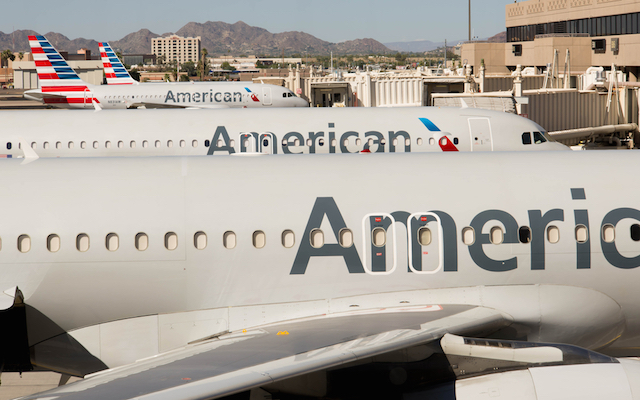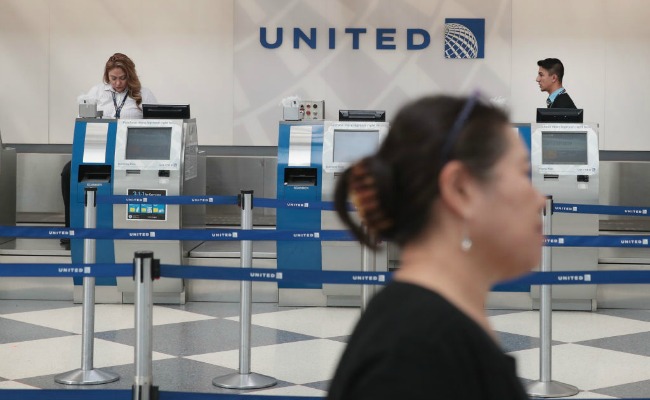It was 10:30 pm on a Sunday night. I’d just landed in Dallas — having flown in from Jamaica on my way to Los Angeles. After deboarding, I learned that my connecting flight was delayed until the next morning. I motioned to my partner, who scooped up our toddler son.
Tired and irritable, we went to wait in the rebooking line. It took more than an hour to actually see someone.
“Will we get hotel, taxi, and food vouchers?” I asked a clerk when I finally got to the front of the line.
She shook her head. “Your flight was delayed because of weather, so we’re not liable.”
“Weather?” I asked. “Weather where?”
“In Cleveland,” the clerk said with a tight smile. She was, all things considered, pretty friendly. “The plane you were supposed to be on had a refueling stop there.”
In airline speak, “weather” can mean weather just about anywhere on earth. In our case, it meant a city that wasn’t even on our itinerary. Since the plane we’d be on was passing through Cleveland before getting to Dallas, my family’s flight from Jamaica via Dallas to Los Angeles was delayed overnight (costing us $200 and two days off) because of a snowstorm in Ohio.
This story isn’t unique. In fact, it’s painfully mundane. The sort of anecdote we all tell about airlines.
“The guy in front of me reclined into my knees.”
“They played blaring ads at takeoff and landing.”
“They smashed my violin/surfboard/drum.”
The whole experience boils down to an old Seinfeld bit — “What is the deal with flying?” (I’ve heard the “I dropped something at my feet, tried fishing around for it, craned my neck to look for it, and the jerk in front of me reclined right on top of my head”-story no less than 15 times). But behind the agonizing comedy-of-errors aspect of the entire flying experience, these airlines are real businesses ruled by real executives who, believe it or not, like to think they have a clear gameplan. They’re pretty good at executing it, too.
Not a plan for “getting customers from point A to point B happily,” of course. A plan for making profit.
After the fallow post-9/11 years — a decade during which United, Delta, and American all filed for bankruptcy — airline-profit-per-passenger in 2019 was hovering around $19.65 per flight. That’s a very healthy number for the industry, and its origins won’t surprise you. Most of the credit is due to the increased load factor of airlines and higher ancillary revenue. You know, smaller seats and bigger change fees; less legroom and more baggage charges.
For everyone who isn’t sitting in first-class or holding airline stock, the whole endeavor of flying has become something to be endured. Bags cost. Snacks cost. While we debate whether it’s ethical if we recline our seats a half-inch, airlines race to patent “standing room coach.” Which makes the fact that these same airlines are suddenly in need of taxpayer-funded support quite the plot twist.
Because the $6 trillion stimulus package — details of which will become clear over the next few days — offered congress the chance to attach strings to the money. Strings that could actually make flying more tolerable, sustainable, and user-friendly. More importantly, the conditions could help prevent the next bailout. Whether that comes in August 2020 or 2030.

The biggest confusion with airlines seems to be dissonance over what their purpose is. Customers seem to think airlines are for getting from one city or country to another rested and reasonably happy. So when we have someone’s dandruffy head in our laps or the flight we booked and paid for tries to boot us off, we get upset. The government seems to think that airlines provide an economic motor for the nation — ferrying us to and from our meetings (where we generate money for businesses while drawing income) and vacations (where we generate money for businesses by spending income). So when airlines fail, they race to find a fix — even if that means bailing out an industry that could have afforded to build itself a gigantic firewall.
But the most surprising view on the function of airlines comes from the airlines themselves. Over the past decade, they’ve focused on creating wealth for investors above all else. Yes, much of that is by flying planes full of people from one place to another, but by every available metric, that bit is a secondary concern. Shareholders sit miles in front of even first-class passengers in the minds of the major carriers.
American Airlines makes an easy case-study of the contempt-for-customers versus love-for-shareholders dynamic. In 2018 (the last full year for which this data has been published), AA received the most baggage, cancellation, delay, reservations, customer service, refund, disability, oversales, and discrimination complaints filed with the Department of Transportation. (American had the third-largest domestic market share that year and is currently the third-largest airline overall, though it was first in 2018.) But customer gripes didn’t stop the profits from rolling in.
2018 and 2019 were banner years for AA. In 2018, their net profit after tax was $1.4 billion. 2019’s final numbers haven’t been released yet but the earnings-by-quarter show significant year-over-year growth. In the company’s 2019 fourth-quarter earnings report, AA attributes this success to an increase in passenger load factor (essentially the number of bodies on the plane) and total revenue per available seat mile (TRASM). They do not mention their maligned user experience or the fact that regardless of the rubric used they rate near the bottom in reliability. And rather than properly investing in fixing these pain points or preparing for a global pandemic (a danger to their business which they flagged in a 2018 SEC filing), they allocated $1.3 billion dollars to investors via stock buybacks and dividends.
The alternative to the industry-wide trend of stock buybacks and issuing dividends would be to keep cash on hand or invest in other parts of the business. Apple, which has long been forced to defend its habit of holding a lot of cash, has become a tantalizing prospect for investors during the coronavirus shutdown. Unlike the airlines, the tech giant has the liquidity to keep people employed and weather the quarantine. Meanwhile, even President Trump — whose corporate-friendly tax plan created a 55% increase in buybacks in 2018 — has been disappointed with the airline industry’s over-reliance on this particular financial instrument.
“When we did a big tax cut, and when they took the money and did buybacks, that’s not building a hangar, that’s not buying aircraft, that’s not doing the kind of things that I want them to do,” he said, discussing a potential bailout last Friday. “We didn’t think we would have had to restrict it because we thought they would have known better. But they didn’t know better, in some cases.”
Of course, seeing that frontline employees are far more vulnerable than airline executives, all that excess capital also could have been used to pay for more sick leave or increase wages. It could have funded new green initiatives or research. It could have paid for updates to planes or an improved customer experience. But given what we know about airlines, these suggestions seem almost quaint. (You shouldn’t be surprised to discover that Boeing, whose shortcuts on the navigation system for the 737 Max 8 led to two crashes and 346 deaths in 2019, is another egregious abuser of stock buybacks.)
The point is simple: Airline CEOs take fiduciary duty far more seriously than they take any semblance of responsibility to the general public. So it’s become essential that with same pen stroke with which we bail them out, we need to set parameters on what they’ll look and operate like post-stimulus.

The idea of setting guidelines for any airline industry stimulus money has a lot of traction at this point. Airline CEOs themselves wrote a letter to Nancy Pelosi suggesting:
- A limit on executive compensation.
- No stock buybacks over the life of the loans.
- No stock dividends over the life of the loans.
That’s an okay baseline, but you can almost hear the CEOs begging the Speaker not to set harsher terms. Elizabeth Warren, who has a plan for everything, took an even stricter line:
Let me be clear: We're not doing no-strings-attached bailouts that enrich shareholders or pay CEO bonuses. Period.
— Elizabeth Warren (@SenWarren) March 17, 2020
She wants rules about worker compensation and furloughs — both of which should be ultimatum-level conditions on any money. She also wants to see a permanent end of buybacks and dividends in the airline industry (a wise idea that’s pretty unlikely) and no executive bonuses for three years (a wise idea which might pass in our current climate).
“I am fine with restricting buybacks,” Trump said Friday, according to CNN. “In fact, I would demand that there be no stock buybacks. I don’t want them taking hundreds of millions of dollars and buying back their stock, because that does nothing.”
Others have suggested that we use this stimulus to create rules about the in-flight experience, restrict seat re-sizing, cap change fees, create fuel-usage benchmarks, or even pay the working public interest on their loans. Creating an industry-wide financial relief fund for future emergencies is a no-brainer, too. Essentially: to re-regulate a de-regulated industry.
Over the next few days, it will become clear whether or not lawmakers heard those pleas and treated it like one big “yes, and…” improv game when negotiating. Hopefully, they did. The more caveats on this faltering industry the better. This is the time to do it, too — when we finally have leverage. Because as I discovered on my flight from Jamaica, and we’ve all discovered at some point or another, the airlines haven’t felt that the people who actually fly on their planes matter much in quite some time. Maybe the quarantine has shown them that we can survive without them better than they can without us.
Whatever the terms of the final deal are, it’s essential that they create a shift in how airlines approach their relationship with flyers first and foremost. They need to turn these companies from wealth-creating machines (check the surging stock prices of airlines and Boeing since the stimulus was announced!) back to businesses interested in pleasing their customers. Because if history is any indication, if we miss this chance to call the shots moving forward, the airlines sure as hell won’t do it themselves.

